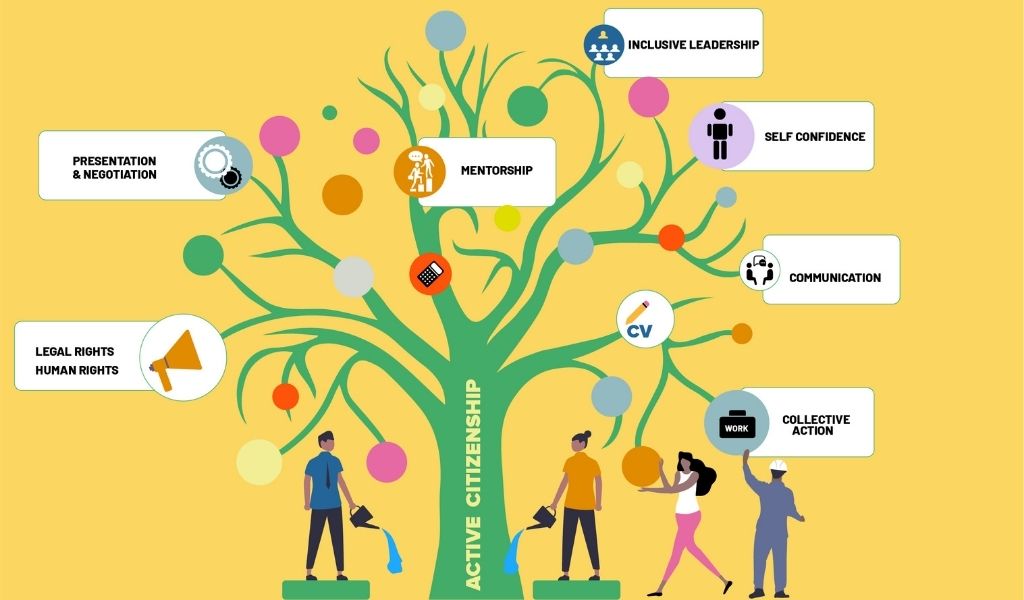Today, IDS and three of our partners in Zimbabwe launch a Handbook that will help to integrate youth active citizenship strategies in employment interventions.
It is not just the magnitude of youth unemployment that is a global challenge, but the creation of enough decent, good-quality jobs for youth. Civic skills are essential for negotiating fair, safe and decent work and for influencing a conducive policy environment. The Handbook recognizes the need to engage the informal economy and be aware of the political economy of youth employment interventions.
Overlooked: civic skills for decent jobs
Youth employment programmes usually strengthen young people’s business and entrepreneurship skills. But they fail to consider the civic and political competencies needed by young people to negotiate fair, safe, and decent working conditions and influence the wider policy environment for decent work. Young men and women need to learn which avenues to use to demand fair pay and hold employers and state actors accountable for labour rights violations. Young women need to be able to challenge sexual harassment. The knowledge and confidence needed to do so, can only build over time and with the right support.
The Handbook ‘Youth Active Citizenship for Decent Jobs’ has been created for development partners and civil society actors that design and implement youth employment interventions. It offers suggestions for integrating youth active citizenship strategies into youth employment interventions, thus building young people’s civic and political skills. Adopting these strategies will strengthen the capacities of young people to engage both private sector and government actors, foster inclusion, and strengthen coalitions that can influence an enabling environment for decent jobs for youth. The Handbook includes six areas of recommendation:
- Respond to political context
- Build civic skills and knowledge
- Strategize for inclusive and safe workplaces
- Address social and gender norms
- Build alliances for national policy influence
- Engage the informal economy

Respond to political context
Donors and implementing organisations need to be aware of the political economy of youth interventions as these can be a political resource to some actors. In some places, targeting beneficiaries can create social divisions. In other contexts, political actors manage to divert resources to their patronage networks. The Handbook recommends doing a conflict and political economy analysis to help the design of interventions, and honouring ‘do no harm principles’.
Build civic skills and knowledge
Whether working in formal or informal employment, young people need knowledge of relevant rights, laws and policies and to acquire a range of civic and political skills to use them. They need to know who can support and represent them, and they need the skills to negotiate fair pay and safe and decent working conditions as individuals. This includes growing the confidence and ability to stand up for yourself, learning to present an argument and negotiate. Collective capacities are essential for developing awareness and action, as are role models and mentors.
Strategize for safe and inclusive workplaces
Multipronged strategies are needed that strengthen civic competencies of young people on the one hand, and capacities of firms and governments on the other. Donors and implementing organisations involved in ‘matching’ young people to private sector actors need to actively work with employers to create safe and decent working conditions, including putting in place gender and inclusion policies and workplace sexual harassment policies.
Address social and gender norms
Age and gender hierarchies limit young people’s opportunities to negotiate with employers and government actors. Young women especially can be marginalised in social dialogues and in unions and worker associations. Addressing social norms takes longer-term strategies while firms and companies can support this process by encouraging young women to attain leadership roles. Young people’s meaningful participation in social dialogue needs to be supported.
Build alliances for policy influence
Youth participation needs to extend to labour market policies, labour rights, social protection and financial inclusion policies. This will require active coalitions between youth civil society, women organisations and associations for informal workers and traders. Donors can pave the way for youth participation through policy dialogue with their government counterparts.
Engage the informal economy
Many relatively disadvantaged youth work in businesses and trades in the informal economy. When planning employment interventions, young people’s experiences with informality need to be addressed. At the same time, programmes must support young people and help formalize businesses, and young informal traders need to be able to negotiate about the conditions to formalize their businesses. The Handbook explains how the decent jobs for youth agenda can make stronger connections to International Labour Organisation (ILO) Recommendation 204 concerning the Transition from the Informal to the Formal Economy.
Research informing the Handbook’s strategies
The Handbook is based on findings from the ‘Learning on the Streets’ project, which was funded by the UK Economic and Social Research Council (ESRC) and focused on young urban traders in cities in Zimbabwe. Key findings included that young traders in Zimbabwe learn how to develop their businesses informally among themselves, and simultaneously learn to navigate urban politics and the contestation between various partisan actors over business opportunities. The study showed that young women frequently experience sexual harassment by customers and law enforcement actors.
Representatives from youth civil society, informal trader associations, city councils and relevant Ministries will meet today in Harare to discuss the findings of the research project. The workshop will include a training by informal trader associations on how to have dialogues with government actors; and a session by Oxfam Harare on how to tackle workplace sexual harassment. A webinar for donors and international civil society is scheduled for 31 March 2022.

